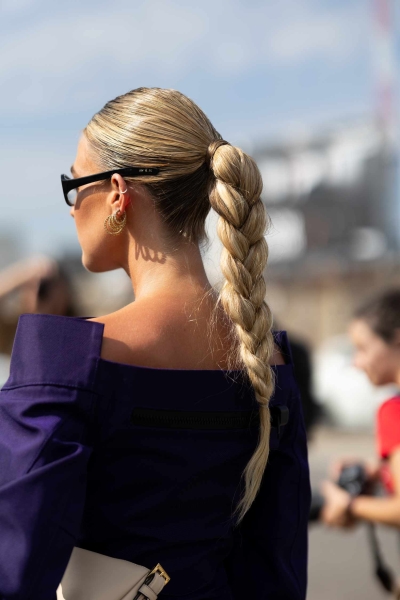Contents
Black seed oil, often referred to as “liquid gold,” has been cherished for centuries for its powerful health and beauty benefits. Extracted from Nigella sativa seeds, this nutrient-rich oil is loaded with fatty acids, vitamins, and antioxidants. According to trichologist Sara Hallajian, these nourishing elements work in harmony to deeply hydrate and revitalize both the scalp and hair, making black seed oil an exceptional moisturizer.
Meet the expert
- Taniqua Bennett is the chief marketing and growth officer at EBIN NEW YORK.
Sara Hallajian is a certified trichologist.
Dr. Ali Syed is the chief chemist and founder of As I Am.
Whether you’re looking to boost hair growth or simply maintain healthy, glossy locks, black seed oil provides a natural and effective way to enhance your hair-care routine. Below, our experts dive into everything you need to know about incorporating black seed oil into your regimen.
Benefits of Black Seed Oil

Moisture
"Black seed oil is a moisture powerhouse," says Bennett. "It's particularly beneficial for curly, coily, and textured hair, which often require more hydration. The oil's essential fatty acids help lock in moisture, while its vitamin E content repairs and strengthens the hair. It nourishes both the scalp and strands, making it ideal for anyone dealing with dryness or damage—whether your hair is fine, wavy, or coarse."
Dr. Ali Syed, chemist and founder of As I Am, adds that his research center at Avlon conducted an extensive study on natural oils, including black seed oil. “Our study, which I share more on in my Curly Hair book, found that black seed oil boosts hair moisture by about 12 percent in dry climates and by roughly 15 percent in hot or humid conditions,” he explains.
Promotes Hair Growth
Black seed oil is known for its ability to strengthen hair follicles and encourage healthy hair growth, largely due to a key ingredient called thymoquinone. This powerful antioxidant boasts anti-inflammatory properties that can significantly improve scalp health and potentially stimulate hair follicles. "Hair follicles can sometimes experience inflammation," explains Hallajian, "and using something that reduces this inflammation can improve the quality of hair growing from the follicle, helping to minimize thinning, prevent hair loss, and even support regrowth."
Improves Scalp Health
Black seed oil is also considered mildly antimicrobial and antifungal, which means it can help stop bacteria and mold from growing. “It is especially beneficial for dry scalp that may have dandruff,” says Dr. Syed.
Adds Shine and Luster
Regular use of black seed oil can enhance the overall appearance of your hair by adding natural shine and luster. It smooths the hair cuticle, giving it a polished look
Prevents Premature Graying
The antioxidants in black seed oil can help prevent or slow down premature graying by supporting the health of hair follicles and preserving the pigment in hair strands
Nourishes with Essential Nutrients
Black seed oil is rich in vitamins like A, B, and C, as well as minerals such as iron, calcium, and potassium, which are essential for overall hair and scalp health.
Protects Against Environmental Damage
The antioxidants in black seed oil help protect hair from environmental stressors such as pollution, UV radiation, and free radical damage, keeping the hair healthier and more resilient.
How to Incorporate Black Seed Oil into Your Hair-Care Routine

Pre-Shampoo Treatment
“For pre-shampoo treatments, let the oil sit on the scalp for 15 to 20 minutes, or leave it in overnight for a more intense moisture boost, before rinsing out,” says Bennett. This protects the hair from drying out during the shampooing process and adds extra hydration.
Add to Your Conditioner
Mix a few drops of black seed oil into your regular conditioner or deep conditioner. It helps nourish and strengthen the hair strands, leaving them soft and more manageable.
Hair Mask
Combine black seed oil with other nourishing oils like jojoba or coconut oil. Apply the mixture to your hair from roots to ends. Leave it on for 30 to 60 minutes before washing. This mask hydrates, repairs, and strengthens damaged or brittle hair, reducing breakage and split ends.
Scalp Massage
“Scalp massages are my go-to recommendation,” says Bennett. “They allow the black seed oil to penetrate deeply into the scalp, stimulating follicles while delivering nutrients.” Warm a small amount of black seed oil and gently massage it into your scalp using circular motions. This increases blood circulation to the hair follicles and allows the oil’s nutrients, like thymoquinone, to penetrate the scalp, promoting hair growth and improving scalp health.
Leave-in Treatment
Black seed oil can also be used as a leave-in conditioner to seal in moisture. “Start with a small amount to avoid overdoing the oil and weighing down the hair,” says Hallajian.
Hair Type Considerations
Our experts agree that black seed oil is generally beneficial for all hair types. For high-porosity hair, it helps lock in moisture, making the hair more hydrated and manageable. For low-porosity hair, using smaller amounts as a treatment and rinsing it out can add shine without weighing the hair down. The key is to adjust the application based on your specific hair type.
Risks and Safety Tips
"Black seed oil can feel heavy if overused, especially for those with fine or low-porosity hair," says Bennett. "I recommend starting with just a few drops to avoid buildup. Use it sparingly or mix it with lighter oils like jojoba or grapeseed for a more balanced application."
Some people may experience sensitivity or irritation with black seed oil. Hallajian suggests performing a patch test before applying it to your scalp. "For those with sensitive skin, it’s best to dilute the oil with a carrier oil, such as rosehip or coconut oil, to minimize the risk of irritation," she explains.
How Often Should you use Black Seed Oil
Our experts recommend using black seed oil two to three times a week to boost moisture and promote healthy hair growth without overwhelming your strands. The goal is to maintain a balance, allowing your hair to benefit without overloading it.
